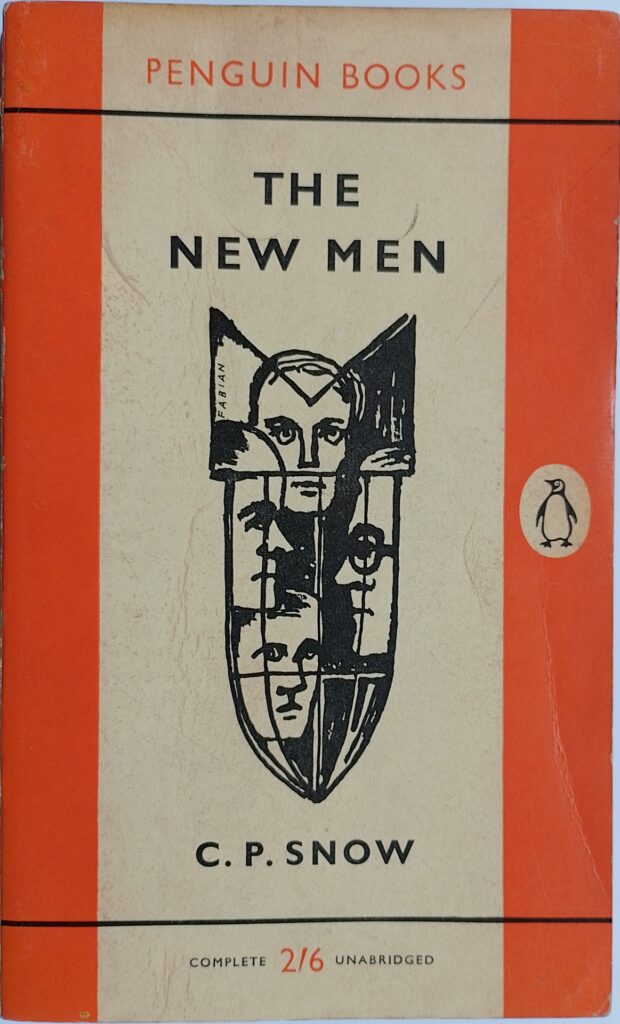First published 1954. Penguin, paperback, 1959, pp 236, c.90,000 words.
C. P. Snow is not in fashion these days, and is currently out of print. I developed a fascination with his work in the early 1980s, reading all his fiction. I picked this off my shelves recently to see how it stood up to the changes in the world and in me since then. It does so surprisingly well.
Snow’s style is considered, some might say ponderous: he writes as observer rather than as instigator of action and that observer is an insider, a committee man, a bureaucrat, a self-satisfied intellectual, confident in his superiority over lesser men, a patriot, slightly priggish but not a class snob, a ‘stuffed-shirt’ to use his own phrase. One critic described his books as being ‘neo-Victorian.’
This is no fast pace thriller, but there is a good story being told here about the development of nuclear weapons in Britain during the second world war. The main protagonist is an academic turned civil service administrator (as was Snow) and much of the story turns on his relationship with his significantly younger, scientist brother.
Snow is concerned with conscience: that of the scientists developing the bomb, the married, lovers, brothers, and of patriots and idealists. All these are explored in his subtle, sometimes convoluted, exploration of human relations. He is much given to highly perceptive aphorisms about our behaviour. For example: ‘Perhaps a flicker of the obscure, destructive satisfaction that comes to a junior partner in a failure for which he is not to blame.’ [p86] Or this: ‘eating himself up with hopes in retrospect, with that singular kind of might-have-been that twists one’s bowels because it still grips one like a hope.’ [p91] And surprisingly this: ‘In those that I had seen die, the bitterest thought was what they had left undone. …I could not recall of those who had known more than their share of the erotic life, one who, when the end came, did not think that his time had been tolerably well spent.’ [p183]. This last is very similar to a remark made in J. I. M. Stewart’s A Use of Riches (1957). I made a note of ten striking passages while reading this again, and at least half of those had been pencil marked by a previous reader. It is these flashes of insight, so well-articulated, that make Snow still worth reading: human behaviour has not changed. Note also, as is typical of Snow’s prose style, the numerous subordinate clauses, elaborating and qualifying, if not unrealistic in making an approximation of bringing to light the way our thoughts emerge into our conscience. As is typical of Snow, the protagonist is given to making pronouncements about the unsuitability of the life choices that other characters make: marrying the wrong person, taking the wrong job. It’s not that every book should end in marriage, but these come across as being mean-minded.
Snow is not beyond using obscure words – perhaps his vocabulary was much greater than mine or he moved in a world that used such words as jargon, or simply that these words have fallen out of use in the more than seventy years since this book was written. I stumbled over ‘surgent’, ‘spicule’, diablerie’ p77, ‘valetudinarian’ p202, ‘scurfy’ p216, and ‘snurge’ p232. The last is not in my Concise Oxford Dictionary and is unlikely to be a typo because it is used twice.
This is one of Snow’s shorter books and its story is compelling, concerning an important moment in history, written by someone who was at least a by-stander at that moment. Consequently it is not a bad place to start if you are new to him as a novelist, or like me, want to re-test the waters. Snow is worth reading for his unusual perspective and his acute observation of the human condition. Just get past the superiority and passivity.
© William John Graham, August 2022

